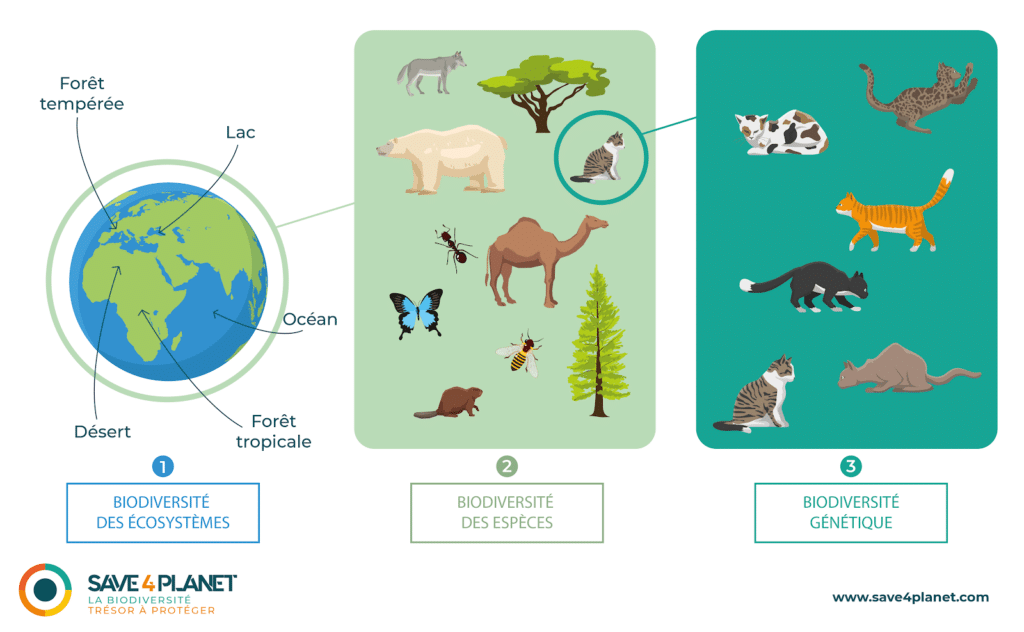Biodiversity and Its Importance
Biodiversity is the diversity of life forms on Earth. It includes not only the different species of plants, animals, and microscopic organisms, but also the ecosystems in which these species evolve. The interactions among them are essential for maintaining the balance and health of the environment.
Biodiversity plays a crucial role in the functioning of ecosystems. Here are some reasons why it is so important:
- Ecological stability: Greater species diversity ensures better resilience to disturbances, such as climate change or invasions of foreign species.
- Natural resources: Biodiversity contributes to the availability of essential resources, such as food, water, wood, and medicines.
- Ecological services: It plays a role in oxygen production cycles, plant pollination, carbon absorption, and water purification.
- Aesthetic and cultural value: Ecosystems rich in biodiversity offer beautiful landscapes and are sources of inspiration for many cultures and traditions.
Maintaining biodiversity requires concerted action on multiple fronts:
- Conservation: Protecting natural habitats and nature reserves.
- Regulation: Implementing laws to prevent the overexploitation of natural resources.
- Education: Raising public awareness about the importance of biodiversity and ways to preserve it.
- Research: Investing in research to better understand ecosystem dynamics and develop innovative solutions.
By promoting a sustainable and environmentally respectful approach, it is possible to protect and even increase biodiversity, thus ensuring a healthy future for our planet and its inhabitants.
Ecological Role of Biodiversity
Biodiversity refers to the variety of living beings and ecosystems present on our planet. It is essential for maintaining the balance of ecosystems and plays a crucial role in our quality of life. By protecting biodiversity, we preserve natural habitats that shelter a multitude of animal and plant species. This also contributes to the stability of local economies that often depend on natural resources.
Its benefits include:
- Climate regulation
- Purification of air and water
- Protection against natural disasters
- Maintaining soil fertility
Each species plays a specific role in its ecosystem, contributing to its balance and resilience. For example, pollinating insects help in the reproduction of plants, while predators regulate prey populations. The loss of a single species can have chain effects, disrupting the entire ecosystem.
Protecting biodiversity also allows for the preservation of valuable resources for humanity. Many plants and animals are the sources of medicines, materials, and technologies. By preserving this wealth, we ensure our own well-being and that of future generations.
Impact on the Economy and Society
Biodiversity is an invaluable resource. It encompasses all forms of life on Earth, from the smallest bacteria to large mammals, including plants and fungi. This biological diversity ensures the balance of ecosystems and contributes to the proper functioning of natural processes such as pollination, decomposition, and climate regulation.
The importance of biodiversity is also evident in its ability to provide essential ecosystem services. This includes the purification of air and water, maintaining soil fertility, and protection against natural disasters. Without these services, ecosystems would not be able to sustainably support human populations.
Furthermore, biodiversity offers an inexhaustible variety of resources. Plants and animals are the foundation of many industries, including agriculture, fishing, and medicine. The genetic diversity within species allows for the development of disease-resistant crops and crucial pharmaceutical innovations for human health.
The impact of biodiversity on the economy and society must not be underestimated. Economically, the loss of biodiversity can lead to enormous costs. Industries rely directly or indirectly on biodiversity for their raw materials and services. When ecosystems degrade, the costs of restoring or replacing these services can be exorbitant.
Initiatives like valuing short supply chains and supporting sustainable agricultural practices demonstrate how preserving biodiversity can bring social and economic benefits. By adopting environmentally friendly practices, businesses can not only reduce their ecological footprint but also create jobs and strengthen local communities.
In the end, biodiversity is essential for the resilience and sustainability of our planet. Protecting this natural wealth is a complex task that requires cooperation and innovation at all levels of society.
Articles similaires
Thank you!
We will contact you soon.













